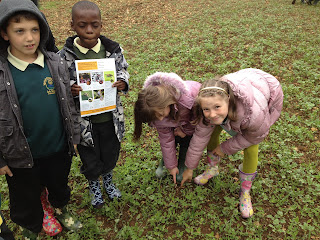I had a really great day at Syngenta 's research centre yesterday at Jealotts Hill. The farm is a LEAF Demonstration Farm as well so we had a lot in common. It was the science though that I found really interesting and the years of testing and assessing all of the products that come to market, from herbicides to fungicides. In fact it can take about 10 years for an active ingredient to be found, tested, made into product, assess, registered, marketed and then finally used in a sprayer. The process starts in the the picture above after between 700-1000 compounds are tested every week and the results are completely unknown. If they show some control of sensitive weeds in this case then they will be put into a herbicide program to see if they can be developed. Obviously the current issue for UK farmers is the control of difficult or resistant blackgrass to which there is no magic bullet waiting round the corner I'm afraid. Onwards with the rotational and cultural control for the time being!
The next area of testing and development is biokinetics where the team discover what happens after the product has attached itself to the leaf. Things like how it redistributes itself, how much sticks on, is it water soluble, how persistent is it, what's its photostability (how stable is it in sunlight) and so on, As products are identified and formulated they are tested in this great rain tower, where between 10mm and 40mm of rain/hr can be applied to see how the product and active ingredient remain on the plant. Here, for demonstration purposes, there was soya, turf, wheat, banana's, and cucumber, all with different leaf characteristics, which all interacted with the active ingredients depending on the size, shape and angle.
We also had a look at the actual application testing methods. How does it behave in a sprayer? Does it stick to the sides, sink to the bottom, will it come out of the nozzle? Here the water is being sprayed through a Defy nozzle (left) and a low drift nozzle (right) to demonstrate the process and the droplets are very different in size and characteristics, with a much coarser droplet from the low drift nozzle.
It really was a great opportunity to see the development and effort that goes into our agricultural pesticides and also good to know how rigorous the testing is before the products are even sent to be registered. As a user of many different products its good to know the level of dedication and science behind the products.










